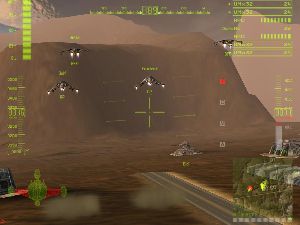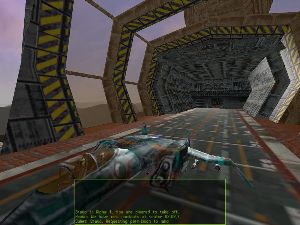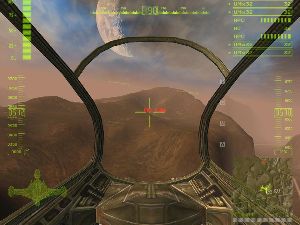Booth babes, autism and kamikazes!
I don’t think anyone dons the mask of disappointment more often than the online
video game critic. If the impending doom of layoffs or the forever-shattered
dreams of a night spent smothered in booth babes doesn’t get you, then the good
old-fashioned shabby programming in all its myriad forms will.
Two months shy of a year ago, I previewed an incredibly promising space flight
game titled Echelon (brought to us by Bethesda Software). This game boasted
vast open vistas, hassle-free Crimson Skies
type gameplay and gorgeous, epic aerial battles. And to some degree, the final
version delivers just that. Unfortunately, the good moments are packed tightly
within too many bad ones. Kinda like when you ask what your blind-date looks
like, but all you hear is how nice she is and all the charity work she’s done.
Echelon opens with a decent cinema sequence bringing the player up to
date with the game’s 300 year history. In the far flung future, humans
do battle with a lost offshoot of humanity, the Vellians, who have mutated into
humanoid beasties (nothing gelatinous or gaseous or anything interesting) by
the alien technology that they have been handling. You are a pilot whose job
it is to shoot down as many of these Vellians as you can. And that’s that. The
plot gets no points for originality.
The story is vast but fails to incorporate the player at all. All missions
have to be finished successfully or you are forced to repeat them, and there
is no in-game save. This is annoying to no end because the Echelon interface
was obviously designed by an autistic person, what with all the clicking.
When a mission ends, successfully or not, you are required to press the Escape
key, which takes you to the ‘End Mission: Yes or No’ screen which in turns necessitates
clicking the Back button through 2 or 3 more screens. Now you are ready to once
again pick your ship, outfit it and start the current missions again or proceed
to the next one (depending if you win or lose) once the game has loaded…yet
again. Whatever happened to the Restart Mission button or the Next Mission button?
It’s just unnecessarily tedious and really pulls you out of the game.
There is a bit of branching within a mission by virtue of different goals,
the fullfillment of which lead to different missions. With 52 missions in all,
there’s some nice variety here. But due to the branching you only wind up playing
about 40 of those, and they’re all pretty run of the mill. Fly to an indicated
waypoint, dispatch indicated enemies or escort indicated friendlies. Standard,
boring and ubiquitous – the missions fit all these descriptions. I’ll let you
pick one.
The graphics, on the other hand, are a great deal better than average. Since
all the battles take place within the atmosphere, virtual pilots are blessed
with beautiful, open mountainous areas with deep narrow canyons that are great
fun for fast and furious aerial chases. Think Death
Star trench run from Star Wars and you’ve got the right idea. The solar
effects are amazing and can actually hinder your visibility, which is really
cool. Bright light! Bright light!
Detailed textures, bump-mapping and appropriate light sourcing are all here
in vivid splendor. Low flying crafts adequately kick up dust or water to produce
a nice effect. And when things blow up, they really blow up.
The ship design is fantastic and imaginative with big, bulbous cockpits (I
can’t believe I just wrote that) that contain visible pilots. Ships come in
two flavors: planes and hovercrafts. The former include really fast fighters,
bombers and an escort ship, while the latter is relatively new to flying games.
These interesting and highly maneuverable hovercrafts are an amalgam of helicopter
type control and lateral propulsion. The end result produces cat-like agility
and a tighter turning radius. These are the ships of choice for those low flying
trench and canyon runs.
 |
|
Click to enlarge! |
Some of the battles are really fun and action packed, but most are rather dry,
requiring pilots to travel long, uneventful distances to get to the fray. Echelon
does offer a time acceleration option to speed things up, but why are the long
drawn out flying sessions even in the game if they serve no purpose? Odd!
Another odd bit is the overall AI. Often pilots (including friendly ones) will
re-enact World War II Japanese Kamikaze runs. These sacrifices are by no means
intentional, however, as this has been labeled a soon-to-be-patched bug. But
for now it’s incredibly annoying to have a fellow teammate collide head-on with
you.
Couple that with no in-game save and the nefarious interface, and minor grievances
quickly becomes rancorous detest. And don’t leave your craft on auto-pilot for
too long, because the on-board computer may just send you careening into a mountain
side. I don’t need any dumb computer to assist me with that. I have crashing
down to a science already.
But the biggest and most unforgivable faux pas Echelon brings to (or
rather, omits from) the discerning gamer is horrible multiplayer support. There
is no network setup with a list of servers to join. Instead, the folks at Buka
Entertainment would rather have you scouring the Echelon site looking
for IP addresses posted by potential players. Do you know how hard it is to
coordinate a multiplayer game with just one other gamer, not to mention seven?
If you can get it going, Deathmatch and Co-op modes in a variety of game types
(including Capture The Fort) await the determined online player. But good luck.
When it’s all said and done, Echelon is a disappointment. I expected
your character to play a more integral role in the story. No such luck. I expected
better AI from a game that has been in development for this long. Nope. Add
to that the uninteresting missions and lack of multiplayer support and you wind
up with a game that was released just a few moons too early.

-
Looks great
-
Imaginative ship design
-
Fun at times
-
Uninvolving story
-
Boring missions
-
Weak AI
-
Frustrating interface
-
Inexcusable multiplayer support







